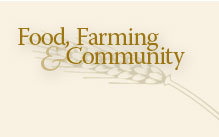Introduction to Food, Farming, and Community
Session 1
Summary
In this introductory session, learners share, discuss and reflect on the role and meaning of food in their lives, communities and cultures. To get acquainted, learners discuss their “food autobiographies” and share what they would include in their “personal food museum.”
Guiding Questions
- What foods and food related traditions are significant to each of us?
- In what ways does food help define identities, cultures and communities?
- What is “good food”? What does it nourish?
Big Ideas
- Food is a core part of identities, cultures and communities.
- Eating is a biological need, but food can also nourish families, spirits, cultures and communities.
- A food system is a series of interdependent elements that provides food to a community. This includes the growing, marketing, distributing, consuming and disposing of food. Food systems are comprised of human elements (farmers, gardeners, business people, and consumers) as well as non-human elements (stores, processing facilities, transportation).
Session 1 Materials
- Facilitator Guide (PDF/6 pgs)
- Learner packet (PDF/10 pgs)
- PowerPoint slides (PPT)




